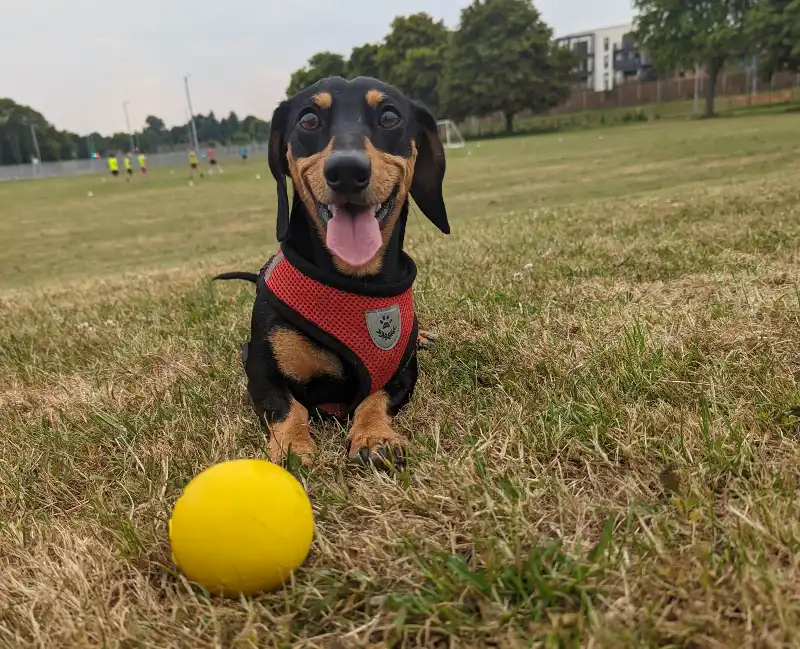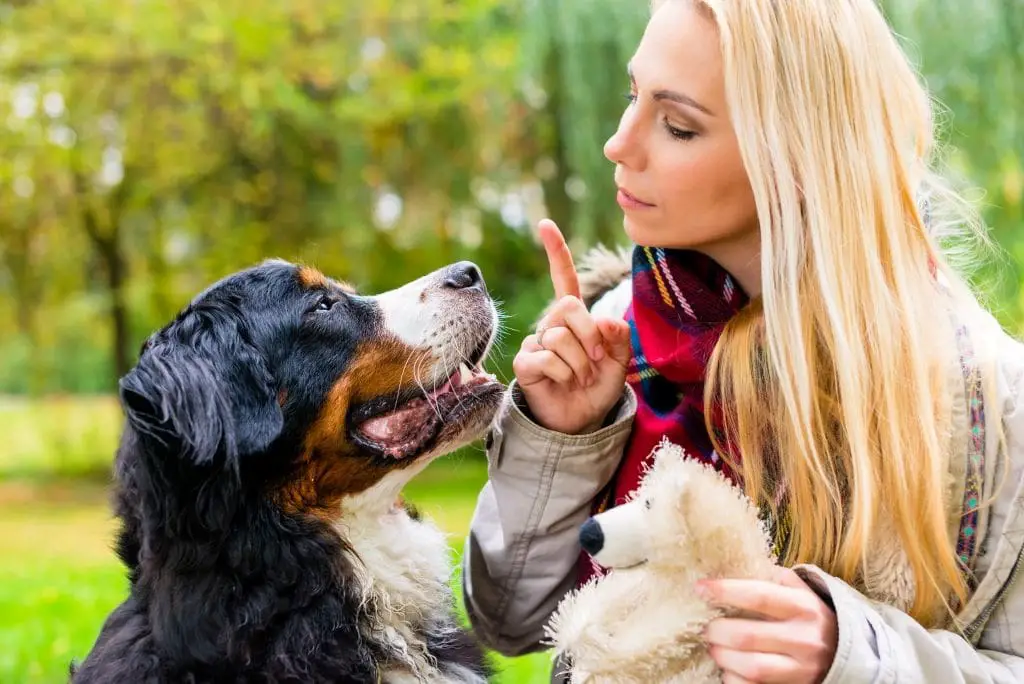Warning: Trying to access array offset on value of type bool in /home/u778996160/domains/dachshundtalk.com/public_html/wp-content/plugins/wp-word-count/public/class-wpwc-public.php on line 123
Warning: Trying to access array offset on value of type bool in /home/u778996160/domains/dachshundtalk.com/public_html/wp-content/plugins/wp-word-count/public/class-wpwc-public.php on line 123
Dachshunds are known for being stubborn and feisty, but are they really hard to train?
The answer is: it depends. Dachshunds are intelligent dogs and can be trained relatively easily, but they do have a mind of their own. They are also known for being independent, so you’ll need to be patient and consistent with your training.
If you’re up for the challenge, then training a dachshund can be a fun and rewarding experience. In this article, we’ll give you some tips on how to train your dachshund effectively.
What are the benefits of training a dachshund?
Having a well-trained dog has many benefits. A trained dachshund will be less likely to bark excessively, dig up your garden, or chew on your furniture. They will also be more obedient and easier to manage when out on walks.
In addition, training can be a great bonding experience for you and your dog. It’s a chance for you to spend quality time together and build a strong relationship.
A dog that knows its place is happier, so training is really beneficial for both you and your dachshund.
How to train a dachshund effectively?

First of all, start early, I mean really early. It’s best to start training your dachshund puppy as soon as they come home with you. This way, they will be more likely to listen to you and less likely to develop bad habits.
It’s also proven that puppies can learn faster than adult dogs, so you’ll have a head start.
Be Patient
Times will get tough, there will be setbacks, and you might feel like giving up. But don’t despair; dogs are different, and some just need more time than others. The key is to be patient and consistent with your training.
If you lose your temper or get frustrated, your dog will pick up on this and become stressed and agitated. This will make training even harder, so it’s important to remain calm and positive throughout the process.
Reward Good Behavior
One of the best ways to train a dachshund is to reward them when they do something good. This could be with a treat, a toy, or even just some praise. Dogs are very food-motivated, so treats are often a very effective way to get their attention and encourage good behavior.
However, you should only give your dog a treat when they have done something that you have asked them to do. Otherwise, they will just learn that they will get a treat for no reason, which is not what we want.
In addition to treats, you can also use positive reinforcement such as petting or verbal praise. This will let your dog know they are doing something right and make them more likely to repeat the behavior.
Be Consistent
It’s important to be consistent with your commands and expectations when training a dachshund. If you constantly change your mind or send mixed signals, your dog will become confused and frustrated.
Dogs thrive on routine and predictability, so the more consistent you are, the easier it will be for them to learn.
Be assertive
Being the leader of the pack is very important when training a dachshund. Dogs are naturally hierarchical creatures, and they need to know that you are in charge.
If you are not assertive, your dog will try to take control, making training much more difficult. So, it’s important to be firm yet fair with your dachshund.
Make it enjoyable
Training your dachshund doesn’t have to be all work and no play. In fact, it’s important to ensure that both you and your dog enjoy the process.
If training is a chore for you, then your dog will pick up on this and become stressed. But if you can make it fun and rewarding for both of you, then you’re much more likely to succeed.
Make time for training
Setting aside time each day to train your dachshund is important. This doesn’t have to be a long session; even just 15-20 minutes will do.
The key is to be consistent and make sure that you are doing some training every day. If you only train sporadically, your dog will quickly forget what they have learned and make little progress.
Remove any distractions
We noticed this really helped when training Scooby. As he is a very excitable dog, it was often hard to get his attention when other things were happening around him.
To help with this, we would remove any distractions such as toys or people before starting a training session. This way, he could focus entirely on what we were asking him to do.
How should you discipline your Dachshund?
Dachshunds (and any dogs, for that matter) respond well to positive reinforcement. This means rewarding them when they do something you want them to do.
The best way to discipline your dachshund is to ignore them when they are misbehaving and give them attention only when they are behaving the way you want them to. For example, if your dog jumps up on you, turn your back and ignore them. Only give them attention when they are sitting calmly.
It’s also important to be consistent with your discipline. If you only discipline your dog sometimes, they will become confused and won’t understand what they are supposed to do.
The same goes for rewarding your Dachshund. You should only give them a treat or verbal praise when they have done something you have asked them to do. Otherwise, they will just learn that they will get a reward for no reason, which is not what we want.
Tips for housebreaking a dachshund

One of the most important things to teach your dachshund puppy is where to toilet. This process is called housebreaking or potty training.
The first step is to choose an area in your garden that you want your dog to use as their toilet. It’s important to make sure this area is easily accessible and free from distractions.
Once you’ve chosen an area, take your dog there regularly, especially after they have eaten or drunk. Praise them when they toilet in the correct place is also a good idea.
If you catch your dog toileting indoors, don’t punish them as this will only make them scared of going to the toilet in front of you. Just clean up the mess and take them outside more often.
With patience and consistency, your dachshund will learn where they are supposed to toilet in no time.
How Do I Stop My Dachshund Peeing When Nervous or Excited?
Some dachshunds tend to pee when they are nervous or excited. This is usually due to a condition called submissive urination and is perfectly normal.
The best way to deal with this is to ignore your dog when they are acting this way. Once they have calmed down, you can praise them and give them a treat.
If you punish or scold your dog when peeing, they will only become more nervous, and the problem will likely worsen.
With patience and understanding, most dachshunds will outgrow this phase and learn to control their bladder. However, some dogs may need medication or behavior modification therapy to help them.
If you are struggling to deal with your dog’s submissive urination, it’s best to speak to a vet to ensure there aren’t any underlying issues.
Why Do Dachshunds Have a Reputation for Being Difficult to Train?
Dachshunds are often said to be difficult to train because of their stubborn and independent nature. They are also very intelligent dogs, which can make training more challenging.
However, this doesn’t mean that dachshunds are impossible to train. You can successfully train your dachshund with patience, consistency, and the right methods.
If you are struggling to train your dachshund, it might be worth seeking help from a professional dog trainer. They will be able to give you specific advice for your dog and help you to overcome any training challenges.
Can you train an older dachshund?
You might have heard the old saying that you can’t teach an old dog new tricks. However, this isn’t necessarily true.
While it might be more difficult to train an older dachshund, it is still possible with the right approach. Older dogs are often set in their ways and less willing to learn new things, but they can still be trained with patience and, you guessed it, a lot of treats.
The benefit of training an older dachshund is that they are often calmer and easier to manage than a younger dog. This can be a big help if you are struggling to keep your dachshund under control.
Other behavior issues with Dachshunds
Unfortunately, Dachshunds do have other behavioral issues you need to keep an eye on and nip in the bud as soon as possible.
Separation Anxiety
Lockdown didn’t do our mental health any favors, and the same goes for our pets. If your Dachshund is used to having you around all the time and suddenly you’re out of the house more, they may start to experience separation anxiety.
The best way to combat this is by slowly getting them used to being alone again. Start by leaving them for short periods of time and gradually increase the amount of time you’re gone. Make sure you give them plenty of toys and chews to keep them occupied, and most importantly, don’t make a big fuss when you leave or come home.
This has been a big issue for us and for Scooby (our dachshund) as he was a lockdown puppy, and now I’m back at work full time.
Unfortunately, there is no quick fix for this; it’s a case of taking it slow and steady and giving and not pushing them too far.
Barking

Dachshunds are known for being yappy dogs, and while this can be cute when they’re puppies, it quickly becomes annoying. If your dog is barking excessively, it’s important to nip this in the bud as soon as possible.
There are a few things you can do to stop your dachshund from barking, but first, you need to identify why they are barking. Are they bored, anxious, or trying to get your attention? Once you know the reason for the barking, you can start to work on a solution.
If your dachshund is barking for attention, the best thing to do is ignore them. As much as it pains us to do this, if you react every time they bark, they will learn that this is how they get your attention. Once they stop barking, you can reward them with a treat or some fuss, but make sure you do this on your terms and not theirs.
If your dachshund is barking out of boredom, you need to make sure they are getting enough exercise. A tired dog is a good dog, so try to tire them out with walks, runs, and games before they have a chance to start barking.
If your dachshund is anxious or stressed, you might need to seek help from a professional dog behaviorist. They will be able to help you identify the root cause of the anxiety and provide you with some tools to help your dachshund relax.
Aggression
Unfortunately, some dachshunds can be aggressive, usually due to a lack of socialization. If your dachshund isn’t used to being around other people or animals, they can become scared and defensive when they are in new situations.
The best way to combat this is by slowly introducing your dachshund to new people and animals in a controlled environment. This will help them to learn that there is nothing to be afraid of and that they can trust you to keep them safe.
If you struggle to socialize your dachshund, it’s important to seek professional help from a dog behaviorist, as aggression could land you and your Dachshund in a lot of trouble.
Possessiveness
This can be a big issue with dachshunds, as they protect their food, toys, and people. If your dachshund is possessive, it’s important to start training them as soon as possible.
One of the best ways to combat possessiveness is by using a trade. This means that you give your dachshund something they want in exchange for what they have. For example, if they are being possessive of their food, you can trade them a treat for their bowl.
It’s important not to just “take” things from your dachshund, as this will only make them more possessive. You need to ensure that they are getting something that is just as good or better than what they had.
We had this issue with Scooby for a while with his chews when we adopted a second dog. He was so possessive that he would growl and snap if the other dog came near him when he had one.
We slowly started to work on this by asking him to “drop it” or “leave it” and then rewarding him with a treat when he did as we asked. It took some time, but eventually, he realized that he wasn’t going to lose his chew if the other dog came near him, and now they could share without any issues.
Neediness
Dachshunds are known for being Velcro dogs, which means they are very attached to their owners. While this is lovely most of the time, it can also be a bit much.
Some dachshunds can become needy and demand your attention all the time. This can be frustrating, especially if you are trying to get things done around the house.
The best way to combat this is by giving your dachshund some “alone time.” This means that you set aside sometime each day where your dachshund is in their crate or another room while you go about your business.
This will help them to learn that they can’t always be with you and that having time apart is actually a good thing. This also goes hand in hand with separation anxiety, which is another issue that some dachshunds struggle with.
If your dachshund is particularly needy, you will want to work on this daily and slowly build up the amount of time they are left alone. You don’t want to leave them for too long at first, as this could make the problem worse.
Wrapping Things Up
Dachshunds are lovely dogs, but they do come with their own set of challenges and can most definitely be hard work to train. But this goes for any dog, really.
The key is to start training early, be consistent, and seek professional help if you are struggling.
With time and patience, you will have a well-behaved dachshund that is the perfect addition to your family. Just remember, they are a bit of a stubborn breed, but it will be well worth it in the end!








